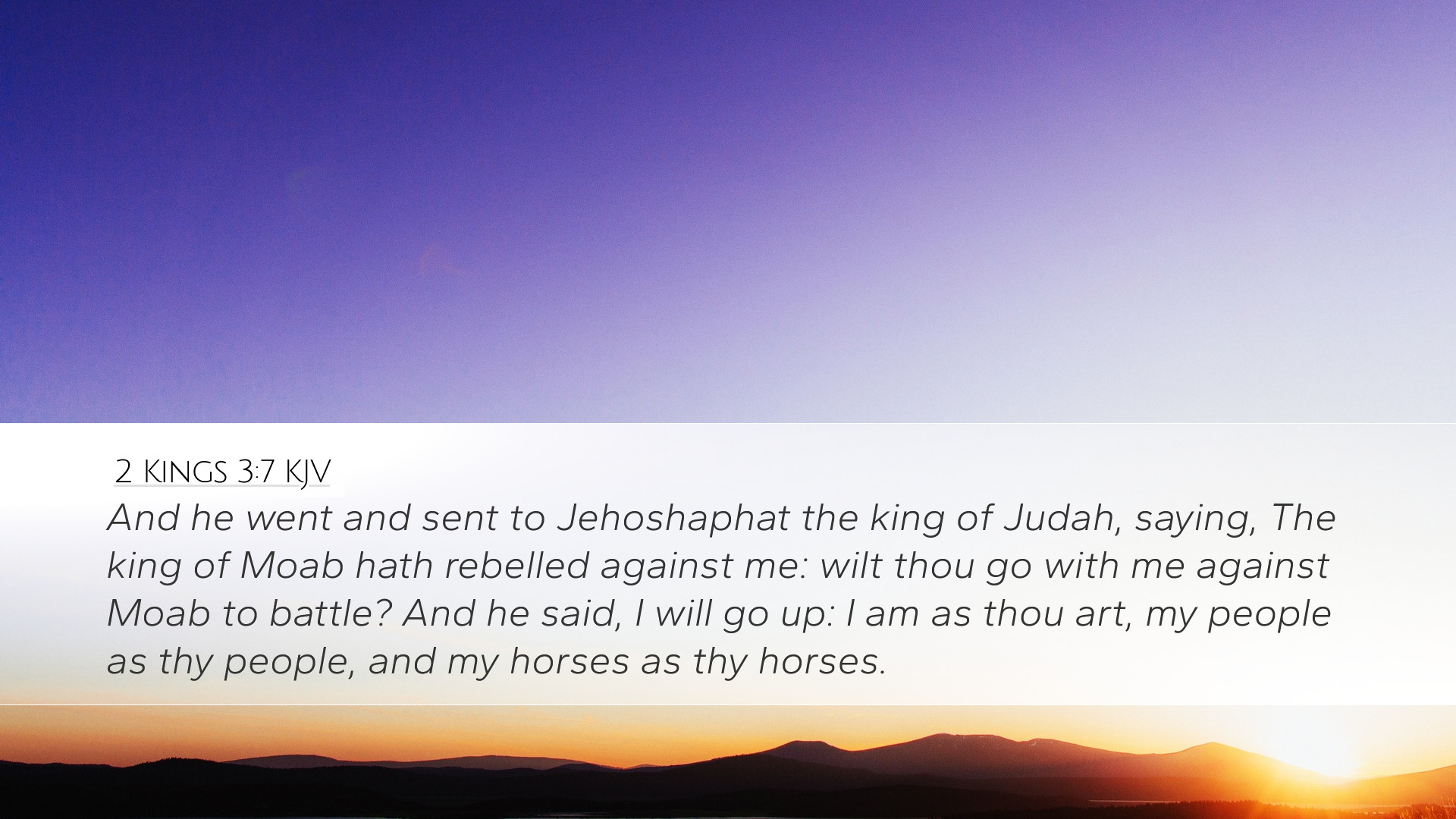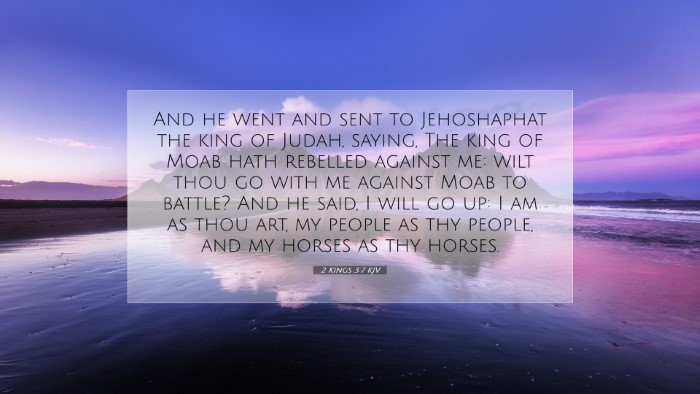Commentary on 2 Kings 3:7
Verse: "And he went and sent to Jehoshaphat the king of Judah, saying, The king of Moab hath rebelled against me; wilt thou go with me against Moab to battle? And he said, I will go up: I am as thou art, my people as thy people, and my horses as thy horses."
Introduction
This verse portrays the political dynamics in the ancient Near East, specifically the alliance formed between Jehoram, the king of Israel, and Jehoshaphat, the king of Judah, against the rebellious king of Moab. Understanding this alliance requires a deeper examination of the historical and theological implications found within this text.
Contextual Background
The context of 2 Kings reveals the tumultuous times faced by Israel during the divided monarchy. After the death of Ahab—a king noted for his idolatry and conflict—the northern kingdom of Israel found itself dealing with threats both external and internal. Moab's rebellion against Israel was a significant geopolitical event, prompting the need for alliances with neighboring kingdoms, particularly Judah.
Historical Context
The relationship between Israel and Moab had a complex history, marked by conflict and mutual hostility. Moab had been subjected to Israelite control but now, feeling empowered under the rule of the king of Mesha, sought independence. This rebellion was both a challenge to authority and a moment that called for unity among Israel's kings.
Exegesis of 2 Kings 3:7
In this verse, several key elements demand attention:
- Initiative by Jehoram: The phrase "he went and sent" indicates the urgency and the need for immediate action from Jehoram. His leadership is highlighted by the fact that he reaches out to Jehoshaphat for support against Moab.
- Coalition with Jehoshaphat: Jehoshaphat's agreement to assist Jehoram underscores the importance of alliances in the ancient world. Their declaration of unity, phrased as "I am as thou art," reflects familial ties and shared interests, transcending their differences.
Theological Implications
This verse illustrates a profound spiritual principle: the necessity of fellowship in facing challenges. Just as Jehoram seeks help from Jehoshaphat, believers are reminded of the importance of community and collaboration. In the face of adversities—be they personal or corporate—God calls His people to support one another.
Insights from Public Domain Commentaries
Matthew Henry's Commentary
Matthew Henry presents this event as illustrating the habitual disobedience of the northern kingdom. He highlights that Jehoram, although seeking assistance, fails to consult the Lord initially, showing a reliance on human alliances rather than divine guidance. Henry notes that this partnership with Jehoshaphat, who was faithful to Jehovah, is paradoxical given Jehoram's idolatry.
Albert Barnes' Notes on the Bible
Albert Barnes emphasizes the political ramifications of Jehoram's request to Judah. He asserts that seeking Jehoshaphat for military support was a significant acknowledgment of his status. Additionally, Barnes explains how this military campaign against Moab reflects the broader theme of God’s providence in using even flawed leaders to fulfill His purposes.
Adam Clarke's Commentary
Adam Clarke provides insights into the nature of the rebellion itself, explaining that Moab’s revolt was driven partly by the heavy burdens imposed by Israel in the past. Clarke examines the character of the kings involved, noting Jehoshaphat’s generally righteous reign versus Jehoram's mixed legacy. His commentary posits that God's People must seek strength through unity in their quest for righteousness.
Applications for Pastors and Theologians
This verse and its commentaries offer ample material for reflection and application:
- Leadership in Crisis: Just as Jehoram sought allies in his time of need, church leaders are called to foster relationships with other ministries, reinforcing the principle of working together for God’s kingdom.
- Dependency on God: The necessity of consulting God in times of crisis is paramount. Leaders shouldn't merely rely on human alliances but should earnestly seek divine direction in their decisions.
- The Importance of Unity: Believers must remember that unity, even among those of differing backgrounds and traditions, is essential in achieving greater objectives, particularly in spiritual warfare.
Conclusion
2 Kings 3:7 encapsulates a pivotal moment in Israel's history, illustrating themes of leadership, alliance, and reliance on God. Through the commentaries of respected scholars, modern readers can glean timeless wisdom that extends beyond the historical narrative, applying its truths to contemporary Christian life and ministry.


